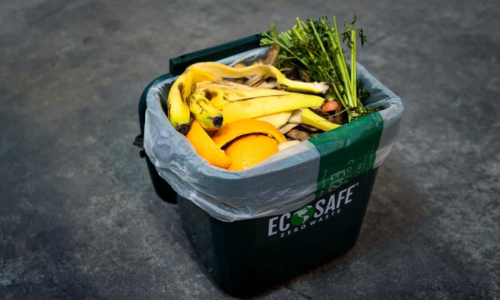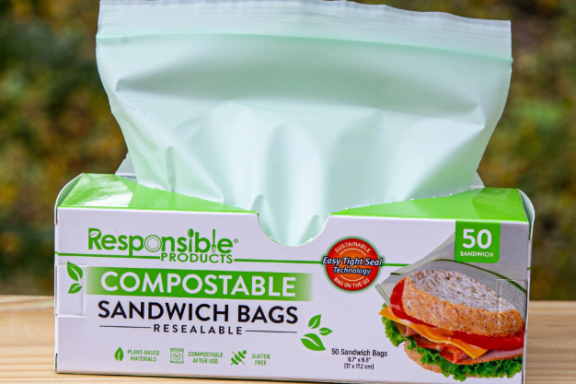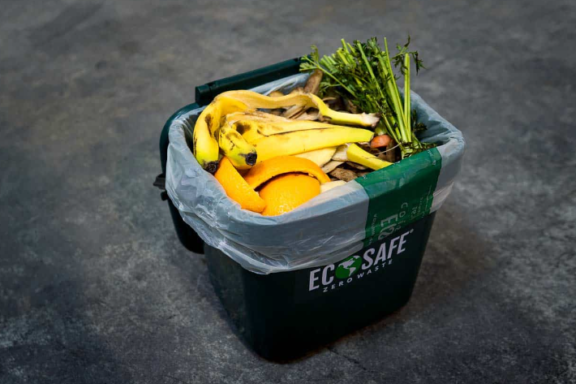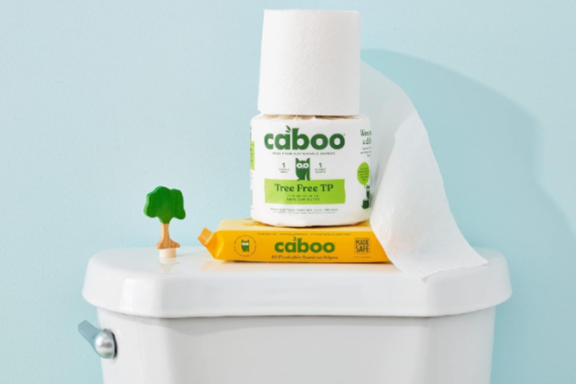- What Makes Compostable Bags So Special?
- 1. Best Large: UNNI 55 Gallon Compostable Large Bags
- 2. Best For Gardening: Biobag Lawn & Leaf Bags
- 3. Best Overall: EcoSafe-6400 Compostable Bags
- 4. Best Budget: Reli. Compostable trash bags
- 5. Best for Portable Toilets: Garden V Pro Portable Toilet Replacement Bags
- 6. Best Small: ANECO 100% Compostable Trash Bags
- 7. Best For Kitchen: Primode 100% Compostable Trash Bags
- FAQs
If you thought taking out the trash had nothing to do with saving the planet, think again! Every year, Americans use about 365 plastic bags per person, adding to over 80 billion of them ending up in landfills. Sadly, these bags take anywhere from 200 to 500 years to fully decompose. Ouch.
It is time to switch to compostable trash bags for guilt-free, eco-friendly waste disposal. Designed to decompose in industrial composting facilities, these innovative bags will transform into nutrient-rich soil instead of harmful toxins.
But with so many products using confusing eco-language, how do you know which bags actually decompose properly? Don’t stress; we’ve got you covered.
After extensive research on BPI certification standards and testing criteria, I’ve sorted through the bogus claims to bring you the 8 best compostable trash bags guaranteed to fully decompose. Time to take out the trash with a clear conscience!
What Makes Compostable Bags So Special?
Compostable bags offer a range of benefits that make them a compelling choice for eco-conscious individuals. Let’s explore some of the top advantages they bring to the table:
- Environmental Sustainability: Compostable bags are made from plant-based materials, such as cornstarch or cellulose. When exposed to moisture, heat, and microbes, these bags break down into nutrient-rich compost, leaving no harmful residue behind. This significantly reduces the amount of plastic waste in landfills and minimizes the impact on ecosystems and wildlife.
- Reduced Carbon Footprint: Compostable bags are made from renewable resources and they require fewer energy resources to produce. Thus, they contribute to fewer greenhouse gas emissions compared to traditional plastic bags. By choosing compostable options, we can help lower our carbon footprint and mitigate climate change.
- Support for Circular Economy: Compostable bags are part of the circular economy model, where products are designed to be recycled or composted, closing the loop of resource utilization. These bags can be composted along with organic waste, creating nutrient-rich compost for plants and agriculture.
- Versatility and Functionality: Compostable bags are available in various sizes and types, catering to different needs. They can be used for food waste, yard waste, packaging, and more. These bags offer the same level of convenience and functionality as traditional plastic bags without harmful environmental consequences.
- Consumer Safety: BPI-certified compostable bags undergo rigorous testing to ensure they meet safety standards. They are free from harmful chemicals, toxins, and allergens, making them a safe choice for handling organic waste and food-related applications.
1. Best Large: UNNI 55 Gallon Compostable Large Bags

Designed to be a versatile eco-friendly solution, the UNNI 55-gallon bags boast an impressively large capacity plus the trusted quality of the UNNI brand. Their roomy interior collects days’ worth of household or commercial food scraps bound for your compost pile.
UNNI manufactures the bags from a proprietary cornstarch and PLA formula, achieving the ideal thickness of 0.85 mils for flexibility and durability.
And you can trust the bags to match their claims thanks to UNNI’s BPI certification. This strict standard verifies 90% conversion in actively managed compost piles within one year. Learn more about how and where UNNI bags Are manufactured.
2. Best For Gardening: Biobag Lawn & Leaf Bags

Biobag’s 33-gallon compostable lawn and leaf bags offer the ideal plant-based alternative for managing yard debris. These large bags provide ample room for grass clippings, leaves, twigs, and branches heading to your composter, municipal pickup, or garden waste pile.
The bags’ thick 0.85 mil BPI-certified bioplastic fabric resists rips and punctures far better than standard paper bags. Yet, Biobag’s exclusive Mater-B formula still guarantees decomposition within 180 days in active compost piles.
BioBag does recommend leaving excessively wet grass on lawns to nourish the soil. But for most yard waste, their 33-gallon bags are strong enough for a 12-day curbside wait before moisture risks deterioration.
BioBag compostable bags meet the strict requirements of BPI certification, ensuring they’re compostable in industrial composting facilities. For collecting plentiful garden debris without harming the earth, Biobag’s compostable yard waste bags deliver the perfect solution. Here is a comprehensive review of the Biobag brand.
3. Best Overall: EcoSafe-6400 Compostable Bags

EcoSafe bags earn the top overall spot for their elite blend of responsibility, quality, and reliability. As Envision’s flagship bag line, the 6400 series boasts full compostability, backed by both BPI and USCC certifications.
Available in volumes of 2.5 to 64 gallons, these plant-based liners suit any home or business. EcoSafe offers multiple durability levels too – both 0.85mil standard and rugged 1.1mil thicknesses resist damage during transport. The bags also comply with ASTM D6400 standards for unquestionable biodegradability in commercial composters.
Yet beyond being completely compostable, EcoSafe production uniquely empowers the visually impaired. Envision Plastics proudly employs over 575 blind and disabled workers under the AbilityOne program.
With each purchase supporting an inspiring social mission plus environmentally sound composting, EcoSafe offers feel-good quality for conscientious consumers.
4. Best Budget: Reli. Compostable trash bags

When every penny counts, Reli offers an affordable way to take the eco-friendly route with composting. At just $47.95 for a pack of 150 13-gallon bags, Reli liners save households and businesses at least 10-15% over premium brands.
The savings come from a smart bioplastic formula blending plant materials and proprietary EPI additives. These ingredients enable rapid breakdown of the bags in commercial facilities and backyard piles while keeping costs low.
And Reli doesn’t cut corners on responsibility – their liners still meet demanding BPI and ASTM D6400 compostability standards. So you can toss the bags along with food waste in municipal composters worry-free.
For cost-conscious consumers and organizations striving to go green, Reli bags deliver bulk value without losing sight of the planet. Now eco-friendly living is possible for almost any budget.
While the materials may differ, Reli matching top certification benchmarks ensures their bags decompose as reliably as pricier alternatives. That’s an unbeatable value for the compost-curious.
5. Best for Portable Toilets: Garden V Pro Portable Toilet Replacement Bags

Heading out on a camping trip or a long journey? Don’t let restroom needs disrupt the fun. Garden V’s specially designed portable toilet bags enable easy waste management anywhere off the grid.
With an ultra-spacious 18 lb capacity, these 0.85 mil thick bags fit most standard portable toilets and buckets. The durable plant-based bioplastic construction resists leaks and tears, securely containing waste and odors.
Garden V guarantees complete compostability too – their portable toilet liners meet both ASTM D6400 and European OK Compost standards. Once you’re done, simply tie up the bag and dig a small hole to bury the bag anywhere in nature. It will completely decompose within a year without harming the soil or surroundings.
6. Best Small: ANECO 100% Compostable Trash Bags

Aneco is a brand of An Phat Holdings. This Vietnamese brand prides itself on offering plant-based alternatives to single-use plastics, including its popular 100% compostable trash bags.
For small bins up to 8 gallons, Aneco’s petite-sized bags are a planet-friendly pick. Available in 2.6 to 8-gallon capacities, their slim shape slides easily into tight spaces like bathrooms, offices, and bedrooms.
Despite the diminutive dimensions, these bags boast surprising toughness from thick renewable plant-based resins. PBAT, PLA, and PBS flexibility prevents early rips yet enables biodegrading in any compost method – industrial and even backyard piles.
That’s right – simply toss your bag of food scraps straight into your home composter after use. Aneco guarantees full decomposition within 6-12 months to nourish your garden beds.
7. Best For Kitchen: Primode 100% Compostable Trash Bags

Kitchens often demand a bag that fits just right for convenient waste disposal. That’s why Primode’s 13-gallon tall kitchen liners are a top choice. With a skinny profile sized for standard indoor cans, these bags prevent annoying overhangs.
But Primode bags aren’t just functional – they’re responsibly made too. Constructed from plant-based corn and starch, the 0.87 mil thickness delivers surprising tear resistance for confident composability.
Multiple stringent certifications back up these claims as well. Primode passes testing for BPI, ASTM D6400, and TUV standards, verifying full breakdown in both at-home and industrial composters.
For kitchens with typical 13-gallon bins, Primode Tall Kitchen Bags check all the boxes. No excess plastic here – just purpose-built compostable liners fitting your space and ethics.
FAQs
What are compostable trash bags?
Compostable trash bags are bags made from plant-based and biodegradable materials like cornstarch or other biopolymers. Unlike regular plastic trash bags, compostable bags can break down in a commercial composting facility.
For more specific food storage options, check out our list of the best compostable sandwich bags to pack eco-friendly lunches.
Are compostable trash bags recyclable?
No, compostable trash bags cannot be recycled with regular plastic recycling. They need to be placed in a commercial composting facility to biodegrade. Do not try to recycle compostable bags with regular plastic recyclables.
Can I compost compostable trash bags at home?
Most compostable trash bags require the higher heat and controlled conditions of a commercial composting facility to fully break down. They will not properly compost in backyard compost bins. Check the packaging to see if a bag is labeled as “home compostable” before trying to compost at home.












No Comments